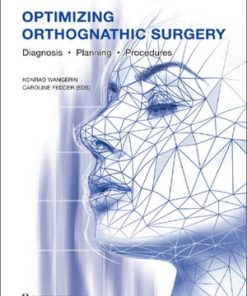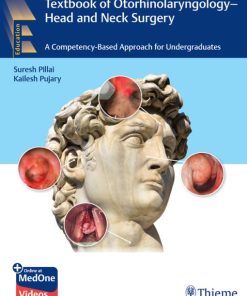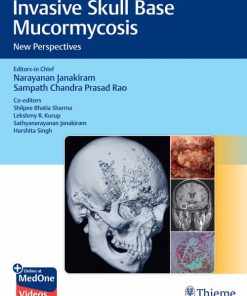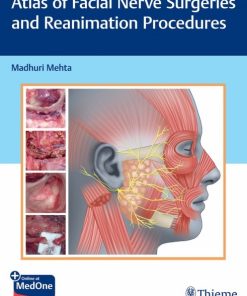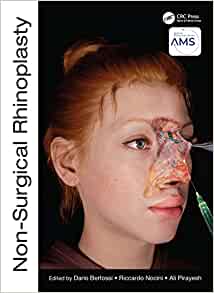HEAD AND NECK SURGERY & OTOLARYNGOLOGY
Simulation-Based Learning in Communication Sciences and Disorders: Moving from Theory to Practice
HEAD AND NECK SURGERY & OTOLARYNGOLOGY
Fundamentals of Anatomy and Physiology of Speech, Language, and Hearing
HEAD AND NECK SURGERY & OTOLARYNGOLOGY
HEAD AND NECK SURGERY & OTOLARYNGOLOGY
100 Complications of Otorhinolaryngology & Skull Base Surgery PDF & VIDEO
HEAD AND NECK SURGERY & OTOLARYNGOLOGY
The Art of Body Contouring: After Massive Weight Loss, 2nd edition Original PDF and Video
HEAD AND NECK SURGERY & OTOLARYNGOLOGY
HEAD AND NECK SURGERY & OTOLARYNGOLOGY
2023 Osteocom Hard and Soft Tissue Augmentation 2.0 – Luca De Stavola
HEAD AND NECK SURGERY & OTOLARYNGOLOGY
Sinus Grafting for Implant Reconstruction (Pikos Online MasterClass Series) – Michael A. Pikos
HEAD AND NECK SURGERY & OTOLARYNGOLOGY
Osteocom Full Tilted Implants Prosthetic and Surgical Protocols 2023
HEAD AND NECK SURGERY & OTOLARYNGOLOGY
HEAD AND NECK SURGERY & OTOLARYNGOLOGY
Optimizing Orthognathic Surgery: Diagnosis, Planning, Procedures (Epub & Converted to PDF)
HEAD AND NECK SURGERY & OTOLARYNGOLOGY
HEAD AND NECK SURGERY & OTOLARYNGOLOGY
2023 Classic Lectures in Head & Neck Imaging – A CME Teaching Activity
HEAD AND NECK SURGERY & OTOLARYNGOLOGY
Structure & Preservation Rhinoplasty Conference 2021 Istanbul
HEAD AND NECK SURGERY & OTOLARYNGOLOGY
HEAD AND NECK SURGERY & OTOLARYNGOLOGY
HEAD AND NECK SURGERY & OTOLARYNGOLOGY
HEAD AND NECK SURGERY & OTOLARYNGOLOGY
HEAD AND NECK SURGERY & OTOLARYNGOLOGY
Working with Voice Disorders, 3e (Original PDF from Publisher)
HEAD AND NECK SURGERY & OTOLARYNGOLOGY
Principles and Practices in Augmentative and Alternative Communication (Original PDF from Publisher)
HEAD AND NECK SURGERY & OTOLARYNGOLOGY
HEAD AND NECK SURGERY & OTOLARYNGOLOGY
HEAD AND NECK SURGERY & OTOLARYNGOLOGY
Jaypee’s Video Atlas of Operative Otorhinolaryngology and Head & Neck Surgery (Videos Only)
HEAD AND NECK SURGERY & OTOLARYNGOLOGY
Ear, Nose and Throat Simplified, 3rd edition (Original PDF from Publisher)
HEAD AND NECK SURGERY & OTOLARYNGOLOGY
ORL: Réussir son DFASM – Connaissances clés, 5th edition (Original PDF from Publisher)
HEAD AND NECK SURGERY & OTOLARYNGOLOGY
HEAD AND NECK SURGERY & OTOLARYNGOLOGY
Invasive Skull Base Mucormycosis New Perspectives (Original PDF from Publisher+Videos)
HEAD AND NECK SURGERY & OTOLARYNGOLOGY
Atlas of Facial Nerve Surgeries and Reanimation Procedures Original PDF
HEAD AND NECK SURGERY & OTOLARYNGOLOGY
Non-Surgical Rhinoplasty (The PRIME Series) (Original PDF from Publisher)
Introduction
Otolaryngology, also known as head and neck surgery, is a medical specialty that focuses on the diagnosis and treatment of diseases and disorders of the ears, nose, throat, and related structures of the head and neck. It is an important field of medicine that can help improve quality of life for those suffering from conditions such as hearing loss, sinusitis, sleep apnea, and more. Understanding the benefits of head and neck surgery and otolaryngology can help you make informed decisions about your health care. This article will provide an overview of the benefits of this specialty and how it can help improve your overall health.
Overview of Head and Neck Surgery & Otolaryngology
Head and neck surgery, also known as otolaryngology, is a medical specialty that focuses on the diagnosis and treatment of diseases and disorders of the head and neck. This includes the ears, nose, throat, sinuses, larynx (voice box), mouth, and salivary glands. Otolaryngologists are trained to diagnose and treat both medical and surgical conditions of the head and neck.
Otolaryngologists are experts in diagnosing and treating a wide range of conditions, including ear infections, hearing loss, balance disorders, sinusitis, allergies, sleep apnea, voice and swallowing disorders, and tumors of the head and neck. They also specialize in reconstructive and cosmetic facial plastic surgery, such as rhinoplasty (nose reshaping) and otoplasty (ear reshaping).
Head and neck surgery is a complex field that requires extensive training and experience. Otolaryngologists must complete four years of medical school, followed by five or more years of specialized residency training in otolaryngology. During their residency, they learn how to diagnose and treat a variety of conditions affecting the head and neck.
In addition to providing medical care, otolaryngologists may also perform surgical procedures. These can include endoscopic sinus surgery, tonsillectomy, adenoidectomy, ear tube placement, and thyroid and parathyroid surgery. Otolaryngologists may also perform reconstructive and cosmetic facial plastic surgery.
Head and neck surgery is an important part of modern medicine. Otolaryngologists play a vital role in diagnosing and treating a wide range of conditions affecting the head and neck. With their expertise and experience, they can help patients achieve improved health and quality of life.
Types of Head and Neck Surgery & Otolaryngology Procedures
Head and neck surgery is a type of surgical procedure that involves the treatment of diseases, injuries, and deformities of the head and neck. It is a specialized field of medicine that requires extensive training and experience in order to perform these complex procedures.
The most common types of head and neck surgery include:
• Craniofacial Surgery: This type of surgery is used to correct facial deformities such as cleft lip and palate, craniofacial anomalies, and other congenital defects. It can also be used to treat facial trauma, tumors, and reconstructive surgery.
• Endoscopic Surgery: This type of surgery is used to diagnose and treat conditions of the ear, nose, throat, and sinuses. It is minimally invasive and can be used to remove tumors, repair damaged tissue, and improve breathing.
• Neck Surgery: This type of surgery is used to treat conditions of the neck such as cervical disc herniation, cervical spondylosis, and cervical stenosis. It can also be used to treat neck trauma, tumors, and reconstructive surgery.
• Skull Base Surgery: This type of surgery is used to treat conditions of the skull base such as acoustic neuromas, meningiomas, and pituitary tumors. It can also be used to treat skull fractures, tumors, and reconstructive surgery.
Otolaryngology is a branch of medicine that specializes in the diagnosis and treatment of disorders of the ear, nose, and throat (ENT). Otolaryngologists are trained to diagnose and treat a wide range of ENT conditions, including hearing loss, sinusitis, allergies, sleep apnea, voice disorders, and more.
Common otolaryngology procedures include:
• Ear Surgery: This type of surgery is used to treat conditions of the ear such as chronic ear infections, hearing loss, and balance disorders. It can also be used to treat ear trauma, tumors, and reconstructive surgery.
• Nose Surgery: This type of surgery is used to treat conditions of the nose such as deviated septum, nasal polyps, and sinusitis. It can also be used to treat nose trauma, tumors, and reconstructive surgery.
• Throat Surgery: This type of surgery is used to treat conditions of the throat such as tonsillitis, laryngitis, and vocal cord paralysis. It can also be used to treat throat trauma, tumors, and reconstructive surgery.
• Facial Plastic Surgery: This type of surgery is used to improve the appearance of the face by correcting facial deformities, wrinkles, and scars. It can also be used to treat facial trauma, tumors, and reconstructive surgery.
Head and neck surgery and otolaryngology procedures are complex and require extensive training and experience to perform. These procedures can help to improve the quality of life for those suffering from head and neck conditions, and can provide relief from pain and discomfort.
Benefits of Head and Neck Surgery & Otolaryngology
Head and neck surgery and otolaryngology are two specialized areas of medicine that focus on the diagnosis, treatment, and prevention of diseases and disorders of the head and neck. These medical specialties involve a wide range of procedures, from reconstructive surgery to endoscopic ear surgery.
Head and neck surgery is a surgical specialty that focuses on the diagnosis and treatment of diseases and disorders of the head and neck. This includes the ears, nose, throat, sinuses, larynx, mouth, and jaw. Head and neck surgeons are trained in both surgical and non-surgical techniques to treat conditions such as cancer, facial trauma, sleep apnea, hearing loss, and thyroid disorders. They also specialize in reconstructive surgery, which can help restore function and appearance after an injury or illness.
Otolaryngology is a medical specialty that focuses on the diagnosis and treatment of diseases and disorders of the ear, nose, and throat (ENT). Otolaryngologists are trained in both medical and surgical treatments for conditions such as hearing loss, sinusitis, allergies, voice disorders, and sleep apnea. They also specialize in endoscopic ear surgery, which uses tiny instruments to access the inner ear and perform delicate procedures.
The benefits of head and neck surgery and otolaryngology are numerous. These medical specialties can help diagnose and treat a variety of conditions, from cancer to hearing loss. They can also provide reconstructive surgery to restore function and appearance after an injury or illness. Additionally, they can provide endoscopic ear surgery to access the inner ear and perform delicate procedures. Finally, these medical specialties can help improve quality of life by providing relief from symptoms associated with various conditions.
Risks and Complications Associated with Head and Neck Surgery & Otolaryngology
Head and neck surgery is a complex field of medicine that requires specialized training and expertise. It involves the diagnosis, treatment, and management of diseases and disorders of the head and neck region, including the ears, nose, throat, sinuses, larynx, and mouth. Otolaryngology is a subspecialty of head and neck surgery that focuses on the diagnosis and treatment of ear, nose, and throat (ENT) disorders.
Head and neck surgery can be a life-saving procedure for many patients, but it also carries certain risks and complications. These include infection, bleeding, nerve damage, scarring, and anesthesia-related complications. In some cases, the surgery may not be successful in treating the condition or may cause further complications.
Infection is one of the most common risks associated with head and neck surgery. The risk of infection increases when the surgery is performed in an area that is difficult to access, such as the sinuses or throat. Infections can lead to serious complications, such as sepsis, meningitis, and abscesses.
Bleeding is another potential complication of head and neck surgery. Bleeding can occur during the procedure or after the surgery has been completed. If the bleeding is severe, it can lead to shock, organ failure, and even death.
Nerve damage is another possible complication of head and neck surgery. Nerves can be damaged during the procedure, leading to numbness, tingling, or paralysis. In some cases, the nerve damage may be permanent.
Scarring is another potential complication of head and neck surgery. Scarring can occur due to the incisions made during the procedure or due to the healing process. In some cases, the scarring may be permanent.
Anesthesia-related complications are also possible with head and neck surgery. Anesthesia can cause nausea, vomiting, dizziness, confusion, and other side effects. In rare cases, anesthesia can lead to serious complications, such as respiratory depression, cardiac arrest, and even death.
Patients should discuss all of the risks and potential complications of head and neck surgery with their doctor before undergoing the procedure. It is important to understand the risks and benefits of the procedure so that you can make an informed decision about whether or not to proceed.
Preparing for Head and Neck Surgery & Otolaryngology
Preparing for head and neck surgery or otolaryngology can be a daunting task. It is important to understand the procedure, the risks, and the recovery process before undergoing any type of surgery.
Before the surgery, your doctor will likely perform a physical exam and order tests such as blood work, imaging scans, and other diagnostic tests. This helps them determine the best course of action for your particular situation. Your doctor may also discuss the potential risks and benefits of the procedure with you.
It is important to follow all instructions given by your doctor prior to the surgery. This includes avoiding certain medications, supplements, and foods that could interfere with the procedure. You should also inform your doctor of any allergies or medical conditions you have.
On the day of the surgery, it is important to arrive at the hospital on time and with all necessary paperwork. You may need to fast for several hours before the procedure, so make sure to plan accordingly. You should also wear comfortable clothing and bring any items you may need during your stay in the hospital.
After the surgery, you will likely need to rest and take it easy for a few days. You may experience some pain and discomfort, but this should subside over time. Your doctor may prescribe medication to help manage any pain or discomfort.
It is important to follow all instructions given by your doctor after the surgery. This includes taking any prescribed medications, attending follow-up appointments, and avoiding strenuous activities. You should also watch for signs of infection, such as fever, redness, swelling, or drainage from the incision site.
Preparing for head and neck surgery or otolaryngology can be a stressful process. However, understanding the procedure, the risks, and the recovery process can help make the experience less intimidating. Following your doctor’s instructions both before and after the surgery can help ensure a successful outcome.
Conclusion
Head and neck surgery and otolaryngology are two important medical specialties that can help improve the quality of life for those suffering from a variety of conditions. From treating hearing loss to correcting facial deformities, these specialists provide a wide range of treatments that can help patients regain their health and well-being. With the help of head and neck surgery and otolaryngology, individuals can enjoy improved physical and mental health, as well as improved quality of life.












